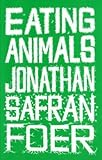Elisabeth
Eating animals
av Jonathan Safran Foer (forfatter).
2009 Heftet
Elisabeths eksemplar av Eating animals
Lesetilstand
Har lest denneHylle
DiverseLesedato
2012
Favoritt
Ingen favoritt
Terningkast
Min omtale
Ingen omtale
Omtale fra Den Norske Bokdatabasen
Denne boken handler om hva vi spiser og hvorfor. Den tar blant annet for seg hva kjøtt er, hvor det kommer fra, hvordan det blir produsert, hvilke økonomiske, sosiale og miljømessige konsekvenser det har, om det er visse dyr det er riktig å spise, og om det finnes situasjoner der det er feil ikke å spise dyr. Med register.
Omtale fra forlaget
Denne boken handler om hva vi spiser og hvorfor. Den tar blant annet for seg hva kjøtt er, hvor det kommer fra, hvordan det blir produsert, hvilke økonomiske, sosiale og miljømessige konsekvenser det har, om det er visse dyr det er riktig å spise, og om det finnes situasjoner der det er feil ikke å spise dyr. Med register.
Bokdetaljer
Utgivelsesår 2009
Format Heftet
ISBN13 9780316072670
EAN 9780316072670
Språk Engelsk
Utgave 1
Finn boka på biblioteket
Finner du ikke ditt favorittbibliotek på lista? Send oss e-post til admin@bokelskere.no med navn på biblioteket og fylket det ligger i. Kanskje vi kan legge det til!
Bokelskeres terningkastfordeling
16 22 4 1 1 0Bokomtaler
Det å spise dyr er mye om kjøtt industrien og etikken. Det får oss til og stille spørsmål. Trenger jeg kjøtt for og overleve? Svaret er nei, etter mye av det skrevne og personlige meninger. Jeg har aldri vært fan av og spise dyr.
Det har alltid vært den skyld følelse, tenk om dyret hadde vondt. Dyret ble laget for å spises. Ikke en fin tanke. Etter et besøk på et slakt hus ble jeg vegetarianer før jeg leste denne boka. Denne boka ga meg så mye nye fakta, tanker og stiller spørsmål. Det er på tide for folk og åpne øyner. Jeg mener ikke alle bør og kutte alt kjøtt bruk, men mengden er den som teller.
Synes denne var bra og hadde mye i seg. Terningkast fem !!
Skriv en omtale Se alle omtaler av verket
Sitater fra dette verket
We can't plead ignorance, only indifference. Those alive today are the generations that came to know better. We have the burden and the opportunity of living in the moment when the critique of factory farming broke into the popular consciousness. We are the ones of whom it will be fairly asked: What did you do when you learned the truth about eating animals?
It´s much easier to be cruel than one might think
Our situation is an odd one. Virtually all of us agree that it matters how we treat animals and the environment, and yet few of us give much thought to our most important relationship to animals and the environment. Odder still, those who do choose to act in accordance with these uncontroversial values by refusing to eat animals (which everyone agrees can reduce both the number of abused animals and one's ecological footprint) are often considered marginal or even radical.
[...] bycatch refers to sea creatures caught by accident - except not really "by accident", since bycatch has been consciously built into contemporary fishing methods. Modern fishing tends to involve much technology and few fishers. This combination leads to massive catches with massive amounts of bycatch. Take shrimp, for example. The average shrimp trawling operation throws 80 to 90 percent of the sea animals it captures overboard, dead or dying, as bycatch. (Endangered spieces amount to much of this bycatch.) Shrimp account for only 2 percent of global seafood by weight, but shrimp trawling accounts for 33 percent of global bycatch. We tend not to think about this because we tend not to know about it. What if there were labeling on our food letting us know how many animals were killed to bring our desired animal to our plate? So, with trawled shrimp from Indonesia, for example, the label might read: 26 POUNDS OF OTHER SEA ANIMALS WERE KILLED AND TOSSED BACK INTO THE OCEAN FOR EVERY 1 POUND OF THIS SHRIMP.
Just how destructive does a culinary preference have to be before we decide to eat something else? If contributing to the suffering of billions of animals that live miserable lives and (quite often) die in horrific ways isn´t motivating, what would be? If being the number one contributor to the most serious threat facing the planet (global warming) isn't enough, what is? And if you are tempted to put off these questions of conscience, to say "not now", then when?
Having little exposure to animals makes it much easier to push aside questions about how our actions might influence their treatment. The problem posed by meat has become an abstract one: there is no individual animal, no singular look of joy or suffering, no wagging tail, and no scream. The philosopher Elaine Scarry has observed that "beauty always takes place in the particular." Cruelty, on the other hand, prefers abstraction.
compassion is a muscle that gets stronger with use, and the regular exercise of choosing kindness over cruelty would change us.
Cruel and destructive food products should be illegal. We don't need the option of buying children's toys made with lead paint, or aerosols with chlorofluorocarbons, or medicines with unlabeled side effects. And we don't need the option of buying factory-farmed animals.
If nothing matters, there´s nothing to save.
To do nothing is to do something.
Legg inn et nytt sitat Se alle sitater fra verket



















































































